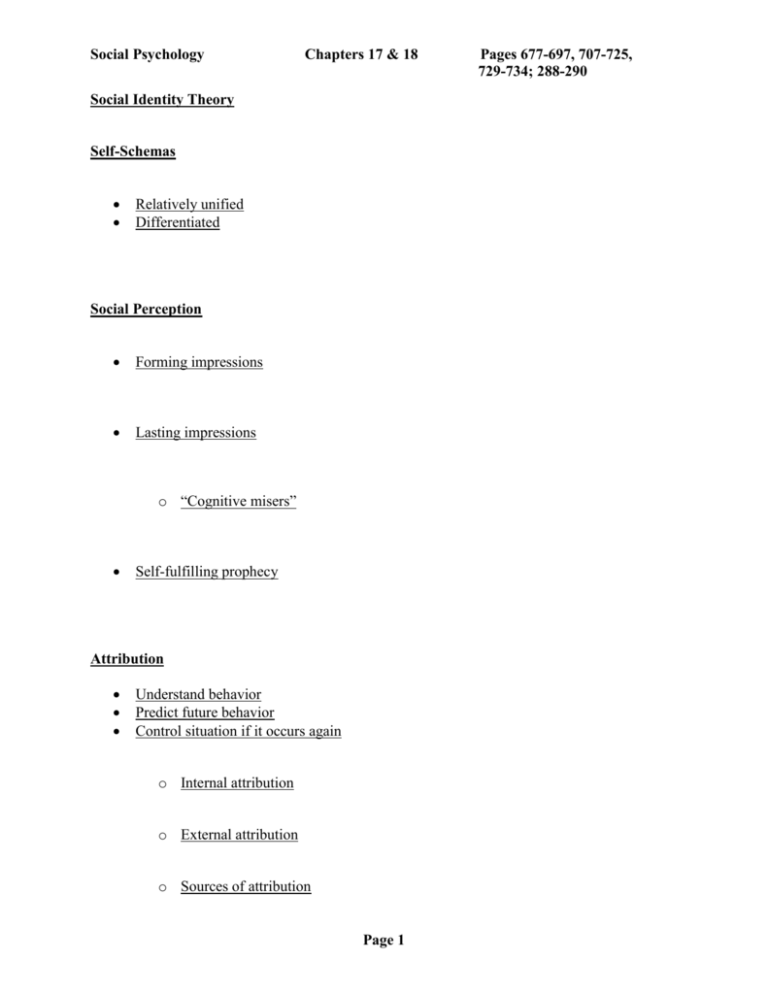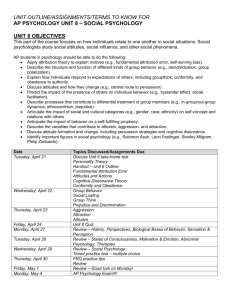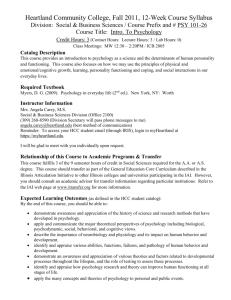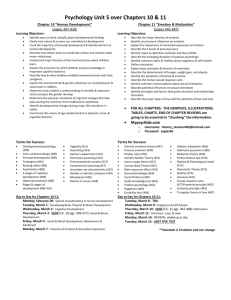Social Psychology
advertisement

Social Psychology Chapters 17 & 18 Social Identity Theory Self-Schemas Relatively unified Differentiated Social Perception Forming impressions Lasting impressions o “Cognitive misers” Self-fulfilling prophecy Attribution Understand behavior Predict future behavior Control situation if it occurs again o Internal attribution o External attribution o Sources of attribution Page 1 Pages 677-697, 707-725, 729-734; 288-290 Social Psychology Chapters 17 & 18 Pages 677-697, 707-725, 729-734; 288-290 Consensus Consistency Distinctiveness Attributional Biases Fundamental attribution error Ultimate attribution error Actor-observer bias (Others’ behavior = internal causes; own behavior = external causes) Self-serving bias (Own success = internal causes; own failure = external causes) Page 2 Social Psychology Chapters 17 & 18 Pages 677-697, 707-725, 729-734; 288-290 Self-Protective Functions Unrealistic optimism (Positive events = you; negative events = others) Unique invulnerability Attitudes Affective component Behavioral component Cognitive component Attitude-consistent behavior o o o o Thoughts & feelings in agreement Behavior consistent with subjective norm One has perceived control One has direct experience with attitude object Forming Attitudes Mere-exposure effect Attitude Change/Persuasive Messages Characteristics of persuasive messages Page 3 Social Psychology Chapters 17 & 18 Pages 677-697, 707-725, 729-734; 288-290 Elaboration likelihood model: Attitude change driven by evaluation of content of persuasive message (central route) or by irrelevant persuasion cues (peripheral route) o Peripheral route o Central route Cognitive dissonance theory Bem’s self-perception theory o Problems Stereotypes & Prejudice Stereotypes Prejudice o Discrimination Page 4 Social Psychology Chapters 17 & 18 Theories of Stereotypes & Prejudice Motivational theories o Authoritarianism o Social identity theory Cognitive theories o Schemas & cognitive shortcuts o Social categorizations Learning theories Reducing Prejudice Contact hypothesis Jigsaw technique Social Influence Norms o Descriptive norms Page 5 Pages 677-697, 707-725, 729-734; 288-290 Social Psychology Chapters 17 & 18 o Injunctive norms Reciprocity Deindividuation Motivation & Presence of Others Social facilitation Social impairment Social loafing Social striving Conformity & Compliance Conformity Compliance o Asch’s experiment Page 6 Pages 677-697, 707-725, 729-734; 288-290 Social Psychology Chapters 17 & 18 Why People Conform Public conformity Private acceptance Why group norms are so powerful When People Conform Ambiguity of situation Unanimity Size of majority o Social impact theory Minority influence Gender differences Inducing Compliance Foot-in-the-door technique Door-in-the-face procedure Page 7 Pages 677-697, 707-725, 729-734; 288-290 Social Psychology Chapters 17 & 18 Low-ball approach Obedience Milgram’s experiment Factors influencing obedience o Expert social power o Legitimate social power Page 8 Pages 677-697, 707-725, 729-734; 288-290 Social Psychology Chapters 17 & 18 o Behavior of others o Personality characteristics Evaluation of Milgram’s experiment Stanford Prison Experiment Aggression Freud’s notion of thanatos Evolutionary perspective Genetic & biological mechanisms Cultural differences o “Culture of honor” Learning Page 9 Pages 677-697, 707-725, 729-734; 288-290 Social Psychology Chapters 17 & 18 When People Are Aggressive Frustration o Frustration-aggression hypothesis Revisions Generalized arousal theory Altruism & Helping Behavior Helping behavior Altruism Arousal: cost-reward theory Costs associated with helping Costs associated with not helping Factors That Affect Helping Clarity of need for help Presence of others Page 10 Pages 677-697, 707-725, 729-734; 288-290 Social Psychology Chapters 17 & 18 o Bystander effect (Kitty Genovese) o Strangers vs. friends Personality of helper Environmental factors o Urban vs. rural o Environmental stress Empathy-Altruism Theory Evolutionary Theory Inclusive fitness Kin selection Prisoner’s Dilemma Page 11 Pages 677-697, 707-725, 729-734; 288-290 Social Psychology Chapters 17 & 18 Pages 677-697, 707-725, 729-734; 288-290 Heuristics Anchoring heuristic: Basing judgments on existing info Representative heuristic: Judging whether something belongs in given class on basis of similarity to other members of class Availability heuristic: Judgments based on info that is most easily brought to mind Page 12





